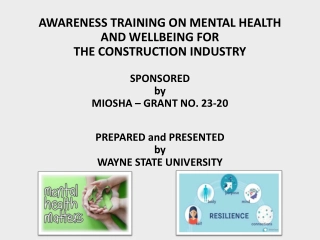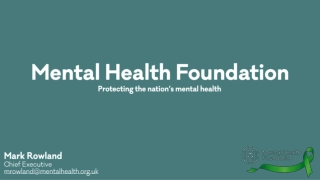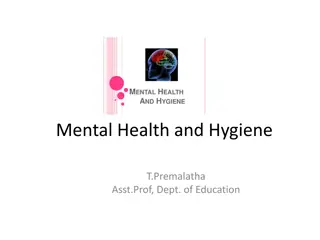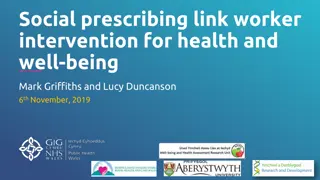Impact of Mental Health on Work and Well-being
Mental health conditions like depression, anxiety, and stress are increasingly affecting populations globally, leading to significant impacts on individuals' work and well-being. People with long-term health conditions, especially mental health issues, face challenges in employment and experience reduced life expectancy. Strategies focused on supporting economically inactive individuals with mental and physical health conditions are being developed to help them start, stay, and succeed in work. Employers play a crucial role in addressing these challenges by providing support and understanding for their employees' mental health needs.
Download Presentation

Please find below an Image/Link to download the presentation.
The content on the website is provided AS IS for your information and personal use only. It may not be sold, licensed, or shared on other websites without obtaining consent from the author.If you encounter any issues during the download, it is possible that the publisher has removed the file from their server.
You are allowed to download the files provided on this website for personal or commercial use, subject to the condition that they are used lawfully. All files are the property of their respective owners.
The content on the website is provided AS IS for your information and personal use only. It may not be sold, licensed, or shared on other websites without obtaining consent from the author.
E N D
Presentation Transcript
Mental health conditions Most reported health condition in 2023 was depression, bad nerves, or anxiety (5 million). Increasing the most. Populations affected: 34% of people aged 18-24 taking time off work due to stress equating to 45,500 people in Kent and Medway11. People in more deprived areas are more likely to be affected12. 1 in 10 women leave work due to menopause symptoms.14
Impact of not working People with long-term health conditions die earlier People with serious mental health and physical health conditions live 15-20 years less than the general population4. LTCs and unemployment is a vicious cycle. People who are unemployed: Are more likely to be obese (31% compared to 26%)8 Are five times more likely to report poor health5 Are more likely to smoke (16% compared to 13%)9 Have poorer mental health6 Are less likely to be physically active (47% compared to 67%)7
Primary Care Networks with most Fit Notes Highest rate of Fit Notes in: Dover Folkestone Sheppey Ashford Ramsgate Margate Gravesend Medway
KMEP Integrated Care Partnership (ICP) Strategic Partnership for Health and the Economy Produce a Health and Work Strategy focussed on economically inactive people with physical/mental health conditions: 1) Start work 2) Stay in work 3) Succeed in work
Draft Membership of new Strategic Partnership 1) Referral Points 2) Providers of support 3) Employers 4) Officer support























